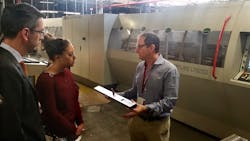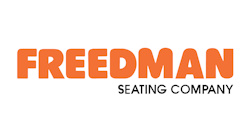The Mass Transit team recently had the opportunity to attend one of the 3,000 events that were going on across the United States for Manufacturing Day. We visited Freedman Seating Co. in Chicago, Illinois, along with the U.S. Department of Commerce Deputy Assistant Secretary Ted Dean, Chicago Alderman Emma Mitts, and a group of local middle school students to see what a job in manufacturing looks like.
Alderman Mitts said it’s important to get to students young and to get parents involved because the kids are often hearing stories of what it was like for their parents to work in factory jobs. Mitts said, “Them saying, ‘Why would you want to work in a dirty factory?’
“Perception is key,” she continued. “People expect dark and dingy places with poor air quality, but that’s not the case anymore. There are a lot of opportunities.”
One employee we had the chance to talk started at Freedman Seating as an intern through a local high school program, Manufacturing Connect with the Austin Polytechnical Academy High School. While Torres Hughes smiled and said he may not have always made the best choices in during his earlier years, he ended up transferring to Austin Polyech because his twin brothers had gone through Manufacturing Connect and were graduates of its first year of the program.
Today, a quality inspector at Freedman Seating, he’s been employed there for 5 years and has been promoted through several positions and talked about some of the challenges of today’s manufacturing jobs. While in years’ past, it was a lot of standardized, unskilled labor, today’s technology demands a lot more troubleshooting and he said you’re constantly having to think.
Freedman Seating President Craig Freedman said there are about 800 employees and they are continually in a hiring phase as there are a lot of new people they have to go through because most don’t make it past about three months because of the new technologies making it more challenging.
Technology Revolution
Freedman Seating today is quite different from its beginnings when Hyman Freedman was upholstering seat cushions for horse-drawn buggies. At the 1893 World’s Columbian Exposition – World’s Fair – in Chicago, Freedman was awarded a diploma of honorable mention for his upholstery skills and that was just the beginning.
Today they manufacture seats and seating-related products for buses, trains, marine, commercial vehicles and delivery trucks.
With the challenge to find qualified employees, being a part of and initiating programs that partner with area schools and organizations is not only about helping others, but about helping them get the workforce that they need to stay competitive.
Talking about some of the challenges they face, Freedman pointed out that on a bus with 40 seats, about 30 of them will be different, due to things like a different mount based where it is on the vehicle.
Not only are there a lot of unique parts, there are also evolving regulations. Beginning in November, newly manufactured buses will be required to be equipped with lap and shoulder belts for each driver and passenger seat on motorcoaches.
Next year they will be introducing a 3-point seatbelt for transit buses but he said they have the ongoing challenge of designing a seat light enough and cheap enough that meets all of the requirements for the different markets they serve.
Great Places to Work
Beyond providing training and outreach programs — a lot of their engineers today started out as local high school and/or college interns — there are a variety of things they do to make it an attractive workplace.
We got to enjoy one of the seemingly simpler things they do, which is to coordinate a food truck coming to the facility once a week during summer. And while to any of us that seems like an easy thing, but John-Paul Paonessa, marketing manager who coordinates it, mentioned it’s a lot of work to arrange it. In the neighborhood there aren’t many convenient options, so many appreciate the unique, varying options.
We also had the chance to visit their new gym, which opened in May. Freedman said they intentionally didn’t want to throw a bunch of nautilus equipment in a room that would sit and collect dust. They brought in equipment and have trainers come three days a week for group-based functional fitness. Aside from getting people healthy, it’s provided a team building-type experience as varying departments work together. There are currently 120 active participants in the program.
Manufacturing Day
Deputy Assistant Secretary Dean said Manufacturing Day is about encouraging students that when they’re thinking about their future, they’re thinking about manufacturing — a great way to build a career and life for themselves.
Manufacturing Day is a celebration of modern manufacturing meant to inspire the next generation of manufacturers. He said there were more than 3,000 Manufacturing Day activities around the country this year.
Alderman Mitts said this particular ward has some of the highest rates of poverty and crime in Chicago, “It’s a very economically depressed area.
“A lack of not investing in these neighborhoods had led to where it is today. The community is fed up. There’s a lack of education and resources and it makes them not want to go to school.”
While we talked at length about the student programs because of Manufacturing Day’s focus, she also talked about the program Freedman Seating has working with previously incarcerated people. “It’s an employer willing to give them that opportunity to get their feet back on the ground,” she said. There have been about 30 people that have gone through that particular program.
She said of the programs offered by Freedman Seating, “They’re providing amazing opportunities to their community.”




